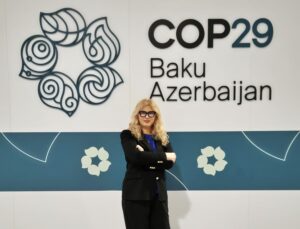The 29th UN Climate Change Conference (COP 29) ended on November 24 in Baku, Azerbaijan. The conference was attended by representatives from more than 200 countries. This year’s climate summit was hailed by experts as the „COP on Finance”.

Claudia Bratu, Partner, TPA Romania
The 29th UN Climate Change Conference (COP 29) ended on November 24 in Baku, Azerbaijan. The conference was attended by representatives from more than 200 countries. This year’s climate summit was hailed by experts as the „COP on Finance”.
As part of a trio of negotiations – COP28 in Dubai, COP29 in Baku and next year’s COP30 in Belem, Brazil – Baku, as expected, produced groundbreaking financial agreements to help developing countries, which are increasingly affected by the negative consequences of the climate and planetary crisis.
The most important of these outcomes are:
- The establishment of a New Collective Quantitative Goal (NCQG) for climate finance. At least $300 billion will be mobilized by developed countries by 2035 to support climate action in developing countries. Poland does not belong to the group of highly developed countries and participates in climate finance only on a voluntary basis, so the new financial target does not impose any additional financial obligations on our country.
- To increase financing from all sources – public and private – to USD 1.3 trillion per year.
- Guidelines for operationalizing market mechanisms under Article 6 of the Paris Agreement. This sets out rules for international cooperation to reduce greenhouse gas emissions through the trading of emission reduction credits.
Data presented at COP 29 show that to meet the goals of the Paris Agreement, there is an urgent need to reduce greenhouse gas emissions by 7.5% by 2035. This requires a significant acceleration of international action.
Claudia Bratu, Partner at TPA Romania, gave me an interview summarizing her participation in the event. In Claudia’s words: „The overall mood at COP29 was a mixture of cautious optimism and pragmatism. While there are undeniable challenges in tackling the climate crisis, the turn towards business-led innovation, finance and clean technologies offers hope for a sustainable future.”
Katarzyna: What is your main takeaway for business from the Baku COP?
Claudia: A climate finance target of $300 billion per year to help developing countries adapt and mitigate climate impacts was finalized. However, many criticized the lack of clarity on the mechanisms to implement and enforce the targets.
Discussions evolved around a global framework for carbon trading and fossil fuel divestment, although agreements remained vague, signaling uncertainty for industries that rely on clear carbon pricing.
There was also a focus on adaptation and equitable sharing. Companies were urged to integrate climate resilience into their operations, and adaptation financing was prioritized alongside mitigation.
There was a strong emphasis on energy transition, with many countries and companies discussing how to diversify energy sources while maintaining energy security.
I believe that the inconclusive results of COP 29 have made it imperative for companies to remain flexible as the regulatory environment evolves, but also to expect increasing public and investor pressure for sustainable action.
How did the COP feel about the political situation in the US? Is a global slowdown in sustainability regulation to be expected?
The outcome of the U.S. presidential election raised concerns among COP 29 participants about the country’s future role in global climate efforts. These concerns were evident in the reluctance of developed countries to fully commit to a $300 billion climate fund for developing countries. The possibility of the U.S. withdrawing from the Paris Agreement could increase uncertainty surrounding the implementation of the fund, with other countries shouldering a greater financial burden.
Despite concerns about a regulatory slowdown around the world, companies and policymakers have reaffirmed their commitment to decarbonization, demonstrating that momentum can continue even with U.S. uncertainty.
The choice of location for this year’s COP has been widely criticized in the media, mainly because of current environmental practices and lack of respect for human rights. What was the atmosphere like at the site? Did you have a chance to get a local perspective on the issue?
Azerbaijan, a major oil and gas producer, has emphasized its efforts to expand into renewable energy, particularly solar and wind power. In addition, the Azerbaijani government sought to portray the conference as a turning point for regional climate action, highlighting the country’s plans to transition to more sustainable energy sources.
However, the choice of Azerbaijan as host was met with criticism, highlighting the gap between the climate summit host’s practices and its goals. On the ground, the atmosphere was charged with skepticism, as a cross-section of civil society and some delegations expressed concerns about the optics of holding a climate event in a country with ongoing oil expansion projects. Local perspectives were divided, with government representatives emphasizing the country’s ambition to be a leader in renewable energy, while activists highlighted the challenges of transparency and inclusiveness, and of rebuilding civil society.
Interview by Katarzyna Chwalbińska-Kusek, Head of ESG Advisory, Baker Tilly TPA.
